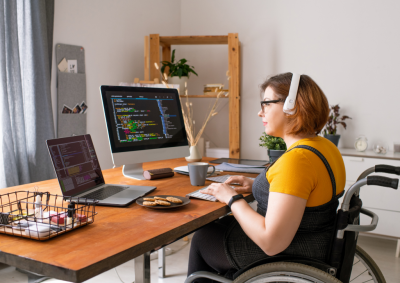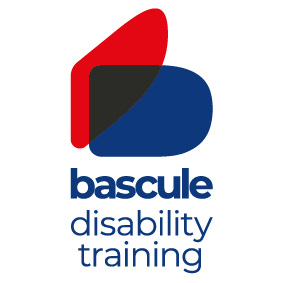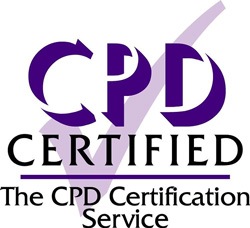Reasonable adjustments for people with disabilities working from home

Currently more people are working from home than ever before- but home may not be the ideal working environment for everyone. For example, I recently had a conversation with a friend who happens to have a disability, who was struggling with working in their home environment.
They said: “I don’t have the equipment I use at work, and I’m finding it difficult.”
“You could ask your employer for help?” was my advice, to which they asked me-
“Does my employer still have a responsibility to make reasonable adjustments- even though I’m working in my own home?”
My answer was, of course, a firm-
“Yes.”
When we think of working from home, we often imagine an environment where everything is readily available and perfectly suited to our needs but the reality is quite different. Generally, our homes are designed for a totally different purpose.
For a majority of people, the workplace has been created, improved and slowly developed to be an environment that is tailored and tweaked to each person’s individual working needs.
An example of this, is when you go on holiday, only to return to work to find your desk or workstation has been temporarily occupied in your absence. Things have been re-arranged, perhaps your ergonomic chair is lower, worse still, it’s been swapped, and you have the rickety one everyone avoids using. The arm rests don’t work, and your monitor is at an unpleasant distance and set at a strange angle and the volume settings are lowered so you can’t hear anything. Chances are, you’ll be unable to work properly until you’ve reclaimed your ergonomic chair and readjusted everything to suit how you work best.
My point is, we work as individuals, and creating and developing spaces that are very specific to our personal needs and preferences is vital, so our working environments must reflect this. For many of us, to suddenly be working in our homes is a huge change- especially if we have particularly demanding physical needs.
Now, take into consideration the following stat- the IWFM (Institute for Workplace and Facilities Management) found that 41% of homeworkers felt they didn’t have an appropriate home working environment. That is a very large portion of working population that are working in spaces they didn’t feel were suitable for work. The consequences of this could certainly impact someone’s health, safety or wellbeing- especially if you are a person with a disability. What is important here is that we realise that whilst homeworking may be a simple switch for some- it might not always be that straight forward for all. Equally, what was initially thought be a ‘one-off’, time limited event, has, in reality now lasted for nearly a year in many cases. Not using your ergonomic chair or having your screen at the wrong height, for example, may not causes problems in the short term but in the longer term the effects might well be more serious. Although this article focuses on disability, such adjustments are required by law for everybody to avoid long term problems.
So, what should someone do if they need a reasonable adjustment for home working?
The first step is having an open conversation with your manager, to discuss the issues you are experiencing and the impact these may be having on yourself personally and to your productivity. Alternatively, it may be more appropriate to have a discussion with a dedicated member of staff in the HR department. Either way, it is important to remember that employers have a duty under the Equality Act 2010, and the Health and Safety at Work Act to make reasonable adjustments for people with disabilities- both at home and in the workplace- and your organisation has a legal obligation to respond accordingly.
What might a reasonable adjustment in the home be?
A reasonable adjustment for homeworking will be specific to yourself and may include the need for assistive technology and devices, a screen reader, software, monitors or display screen equipment. It may be that your home does not provide a desk or ergonomic furniture, pre-assembled equipment, seating, or work surfaces that are vital for your needs.
Perhaps the organisation uses software or communication platforms such as online meeting tools, that present problems related to your disability. You may wish to find and suggest an alternative if you are hearing or sight impaired, for example.
You may require a reasonable adjustment in terms of how you work, for example you may want to review your hours of availability. You may wish to change the times you start or finish- it may benefit you to take longer breaks, or it may be beneficial to take shorter but more regular ones, as they help you function better, or support your health requirements.
Whilst an employer has a legal duty to make adjustments, they can consider the effectiveness of the change, the practicality, the cost of making them, the organisation’s resources available and the general size of the business.
How can employers ensure staff with disabilities have access to environments suitable for home working?
It is a good idea for any employer to consider a risk assessment for all of its home workers, given that employers are as responsible for a worker in their home as they are a worker in the office. Risk assessments in the physical office are very common, so why not assess the home workspace?
This could be done with a template giving all employees the opportunity to perform a general assessment, whilst helping them to address potential hazards or dangers etc.
Alternatively, it could be performed via an online video link, so that advice can be offered, and the overall safety assessed by a manager or health and safety officer. Here consideration for any staff members with disabilities can be given and the opportunity to discuss how each individual can work most safely, comfortably and to their best ability, will be present.
Of course, creating a workplace culture that encourages disclosure and has a positive view and awareness of disability is essential. Opportunities to develop such a culture and improve disability awareness within your organisation, can be accessed through our online training sessions for 2021 or via a bespoke session for your business.
For more information on disability awareness training contact : 0330 3800662 or email info@bascule.com



